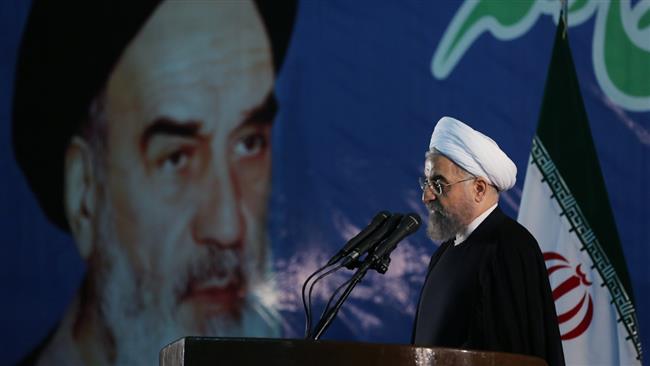
RNA – “The magnanimous Imam rose and braved all the world’s arrogant powers at a time of darkness and historical suppression in Iran,” the Iranian chief executive said on Thursday, addressing thousands of people at Imam Khomeini’s mausoleum in the Iranian capital Tehran.
Imam Khomeini rose up against the country’s rulers who, “neither respected Quranic verses and Islamic principles and culture nor lent an ear to the people’s demands and will,” Rouhani added.
Grand Ayatollah Ruhollah Mousavi-Khomeini was born in the central Iranian city of Khomein on September 24, 1902 to a family of scholars.
He led Iran’s 1979 Islamic Revolution, which culminated in the overthrow of the US-backed Mohammad Reza Pahlavi’s monarchy. He spent more than 14 years in exile, mostly in the Iraqi holy city of Najaf and also in Turkey and France, during the Pahlavi regime before returning to Iran in the lead-up to the victory of the Islamic Revolution.
Imam Khomeini passed away on June 3, 1989 at the age of 87.
Imam dispelled the false beliefs that the monarchical rule was eternal and that the world was dominated by either the Western or the Eastern bloc, Rouhani added.
“Now, we have to prevent the Zionists and the arrogant powers from falsely presenting a marred image of the Iranian nation, the Islamic Revolution, and the Islamic Republic to others.”
The president also hailed the Iranian nation’s achievements over the past years under the guidance of the Supreme Leader of the Islamic Revolution, Ayatollah Sayyed Ali Khamenei, Imam Khomeini’s successor.
“We managed to cement the nation’s rights across international institutions and smite oppressive sanctions,” Rouhani stated.
He was referring to the nuclear agreement, signed in Vienna on July 14, 2015 between Iran and the five permanent members of the UN Security Council – the United States, France, Britain, China and Russia – plus Germany, following two and a half years of intensive talks.
After the two sides started implementing the agreement on January 16, all nuclear-related sanctions imposed on Iran by the European Union, the UN Security Council and the US were lifted. Iran, in return, has put some limitations on its nuclear activities.
R111/112/E